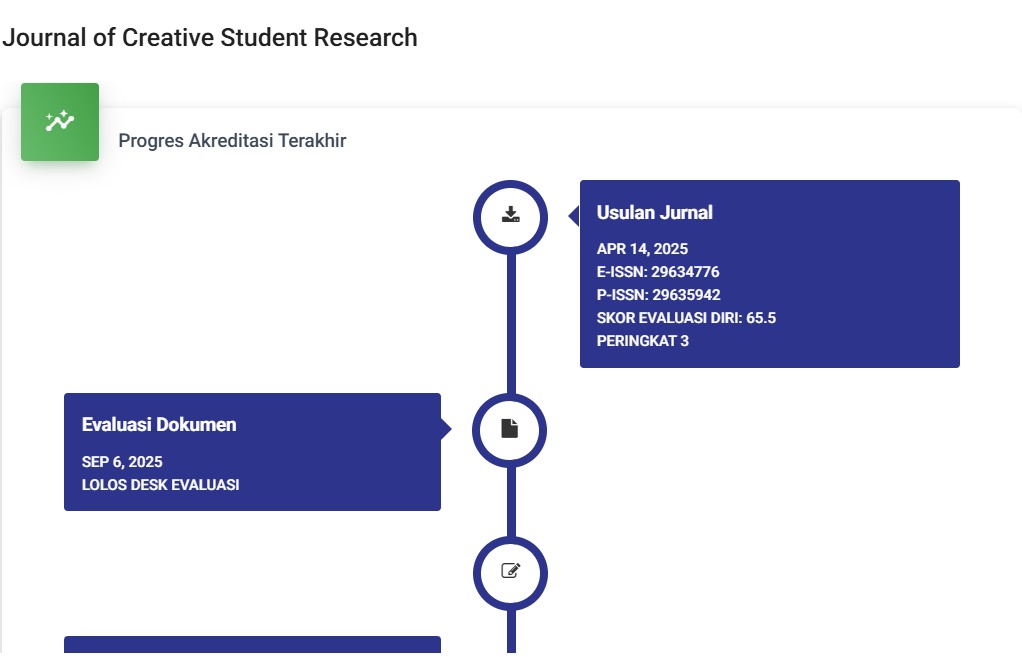Manfaat Kebiasaan Pola Makan Menurut Prinsip Islam Halalan Tayyiban
DOI:
https://doi.org/10.55606/jcsrpolitama.v1i5.2726Keywords:
Diet, Halal, IslamAbstract
There are various types of eating patterns nowadays. This article will discuss one variation of the diet, namely the Islamic diet which has the halalan thayyiban principle. halal means what is permitted while thayyib means what is good. This article also includes foods recommended in Islam, and how these foods can benefit the human body. Halal and thayyib principles also emphasize the process, from taking raw materials to distribution. One of the important processes in food processing is slaughter, there are certain provisions in Islam. This eating pattern also emphasizes adequate eating and appreciating eating, by saying bismillah before eating. Muslims are advised to eat in moderation, eat when hungry and stop eating before they are full. this practice can make eating better. This article also contains scientific research regarding the application of halal and thayyib principles and their relationship to health, such as the link between excessive use of additives, which are not in accordance with thayyib principles, with intestinal infectious diseases.
Downloads
References
Abd El-Rahim, I. H. A., Mashat, B. H., & Fat’hi, S. M. (2023). Effect of halal and stunning slaughter methods on meat quality: A review. International Food Research Journal, 30(2), 290–302. https://doi.org/10.47836/ifrj.30.2.02
Adawiyah Mohd, R., Ghazali, N. M., Nurulwahidah, &, & Fauzi, M. (n.d.). [THEMATIC ANALYSIS OF NUTRITION AND HEALTHY LIFESTYLE BASED ON NUTRIGENOMIC IN VERSE 31 OF SURAH AL-A’RAF]. https://doi.org/10.37231/jimk.2021.22.2.573
Alty Amalia, F., Wang, K.-J., & Gunawan, A. I. (2020). Covid-19: Can Halal Food Lessen the Risks of the Next Similar Outbreak? INTERNATIONAL JOURNAL OF APPLIED BUSINESS RESEARCH, 2020(2), 86–94. https://doi.org/10.35313/ijabr.v2i02.112
Begum, F., Mohideen, S., Syahir Bin Ramli, M., Ibrahim, N., Perubatan, F., & Kesihatan, S. (n.d.). A Review of The Notion of Healthy Eating Practices in Islam For a Healthy Lifestyle.
Deuraseh, N. (n.d.). Halalan Tayyiban Products in Al-Qur’an: The Conceptual Framework in Developing Contemporary Halal Industrial Products for Global Reach.
Dogra, S. A., Rai, K., Barber, S., McEachan, R. R., Adab, P., & Sheard, L. (2021). Delivering a childhood obesity prevention intervention using Islamic religious settings in the UK: What is most important to the stakeholders? Preventive Medicine Reports, 22. https://doi.org/10.1016/j.pmedr.2021.101387
Effendi Hashim Akademi Pengajian Islam Kontemporari, K., Mohammad Akademi Pengajian Islam Kontemporari, N., Sham Kamis, M., Kunci, K., Tayyiban, H., & Makanan, K. (2022). Kepentingan Memahami Konsep Halalan Tayyiban dalam Aspek Keselamatan Makanan di Kalangan Mahasiswa Muslim: Pandangan daripada Perspektif Maqasid Syariah Memelihara Nyawa The Importance of Understanding the Concept of Halalan Tayyiban in Food Safety among Muslim Students: A View from the Maqasid Shariah Preserving of Life. In Journal of Management & Muamalah (Vol. 12, Issue 2).
Elgharbawy, A., Azrini, N., & Azmi, N. (n.d.). HOW EATING HALAL AND TOYYIB CONTRIBUTES TO A BALANCED LIFESTYLE (Vol. 2, Issue 1).
Fadzlillah, N. A., Sukri, S. J. M., Othman, R., Rohman, A., & Jubri@Shamsuddin, M. M. (2022). Concept and Guidelines of Consuming Halal-Tayyiban Food from Islamic and Health Perspectives: A Meaningful Lesson from COVID-19 Outbreak. International Journal of Asian Social Science, 12(5), 169–182. https://doi.org/10.55493/5007.v12i5.4495
Fakultas, K. A., Kesehatan, I., Universitas, M., Kalimantan, I., & Selatan, M. K. (2016). PENDIDIKAN PERILAKU HIDUP BERSIH DAN SEHAT DALAM PRESFEKTIF ISLAM. In Jurnal Sagacious (Vol. 3, Issue 1).
Faulika Permana, R., & Us Bandiyah, S. (n.d.). 42). In Journal of Indonesian Tafsir Studies (Issue 01).
FAYOKEMI, A. W. (2020). FOOD PROHIBITION IN ISLAM: A STEP TOWARDS GOOD HEALTH. International Journal of Scientific and Research Publications (IJSRP), 10(2), p9814. https://doi.org/10.29322/ijsrp.10.02.2020.p9814
Imlan, J. C., Kaka, U., Goh, Y. M., Idrus, Z., Awad, E. A., Abubakar, A. A., Ahmad, T., Quaza Nizamuddin, H. N., & Sazili, A. Q. (2020). Effects of slaughter knife sharpness on blood biochemical and electroencephalogram changes in cattle. Animals, 10(4). https://doi.org/10.3390/ani10040579
Iqbal, A. S. M., Jan, M. T., Muflih, B. K., & Jaswir, I. (2021). The Role of Prophetic Food in The Prevention and Cure of Chronic Diseases: A Review of Literature. Malaysian Journal of Social Sciences and Humanities (MJSSH), 6(11), 366–375. https://doi.org/10.47405/mjssh.v6i11.1144
Jama, K., Awa, N., Bayt, A., & Assembly, W. (n.d.). Authors(s): Publisher(s).
Jarmakiewicz-Czaja, S., Piątek, D., & Filip, R. (2022). The impact of selected food additives on the gastrointestinal tract in the example of nonspecific inflammatory bowel diseases. Archives of Medical Science, 18(5), 1286–1296. https://doi.org/10.5114/aoms/125001
Laudisi, F., Stolfi, C., & Monteleone, G. (2019). Impact of food additives on gut homeostasis. In Nutrients (Vol. 11, Issue 10). MDPI AG. https://doi.org/10.3390/nu11102334
Manickavasagan, A., & Al-Sabahi, J. N. (2014). Reduction of saturated fat in traditional foods by substitution of ghee with olive and sunflower oils - A case study with halwa. Journal of the Association of Arab Universities for Basic and Applied Sciences, 15(1), 61–67. https://doi.org/10.1016/j.jaubas.2013.06.003
Niri, S. A. M. H. (2021). Food Health in the View of Islam. Journal of Nutrition and Food Security, 6(3), 262–271. https://doi.org/10.18502/jnfs.v6i3.6833
Rinninella, E., Cintoni, M., Raoul, P., Gasbarrini, A., & Mele, M. C. (2020). Food additives, gut microbiota, and irritable bowel syndrome: A hidden track. In International Journal of Environmental Research and Public Health (Vol. 17, Issue 23, pp. 1–15). MDPI AG. https://doi.org/10.3390/ijerph17238816
Shahid, M., Israr, M., & Phil, M. (n.d.). Issue 1 Dietary Precautions in Islam …. In Journal Usooluddin (Vol. 5). https://orcid.org/0000-0001-6003-3830
Siti, S. S., Ghazali, M. A. ikhsan, Ibrahim, M. B., & Mustapha, N. I. (2015). Evidence based review on the effect of Islamic dietary law towards human development. Mediterranean Journal of Social Sciences, 6(3), 136–141. https://doi.org/10.5901/mjss.2015.v6n3s2p136
Tapper, K. (2022). Mindful eating: what we know so far. In Nutrition Bulletin (Vol. 47, Issue 2, pp. 168–185). John Wiley and Sons Inc. https://doi.org/10.1111/nbu.12559
The Basic Philosophy of the Halalan Tayyiban Food Quality Management Method. (2016). www.theijbm.com
Zaman, R., Nassir, H. M., Bidemi Abdurrazq, N., Salleh, H. M., & Rahman, M. T. (2012). EFFECTS OF DIFFERENT METHODS OF SLAUGHTERING ON PROTEIN EXPRESSION IN CHICKEN MEAT. In IIUM Engineering Journal (Vol. 13, Issue 1).








